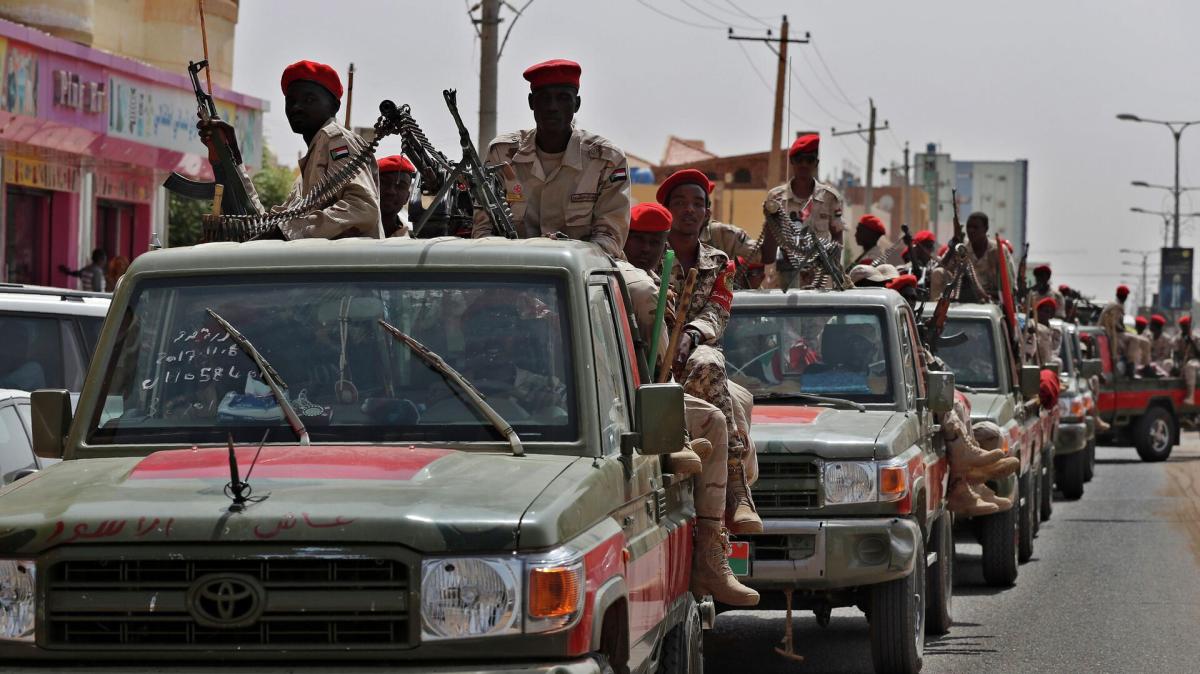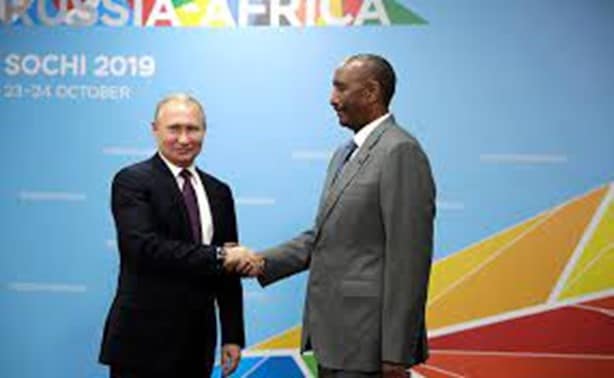Petr Akopov, senior commentator of the Russian state news agency "RIA Novosti," pushed back against accusations by Bernard-Henry Levy and other Western opinion leaders, who accused Russia of fomenting civil war in Sudan.[1] These accusations centered on the role of the Wagner mercenary forces and their boss Yevgeny Prigozhin.
Akopov dismisses these accusations. Both parties to the civil war, along with Prigozhin, have denied any Russian role in the conflict. Moreover, according to Akopov, Russia had no need to stir up a civil war as both sides were favorably disposed to Russia and had recently visited Moscow. The Sudanese, similar to others in the region, had taken the measure of the Americans and found them unreliable. For that reason, China, Egypt, Saudi Arabia, and Russia have become the natural mediators in efforts to end the conflict.
Akopov's column follows below:[2]

Sudanese Rapid Response Forces (Source: RIA.ru)
"In case you were unaware: it's been a week since Russia opened a second front against the West. Where, you ask? In Africa, but not in French Africa (that was last year), but in Sudan. This was announced by Bernard-Henri Levy himself, French philosopher, godfather of the Libyan revolution (i.e., the overthrow of Gaddafi in 2011) and fierce fighter against 'Russian imperialism' anywhere and everywhere.
"Levy revealed to the world the essence of events unfolding in Sudan, 'Putin's methods in Africa? We are engaged in a global war: Ukraine is the first battle front; Sudan is the second.'
"Fighting is indeed taking place in the Sudanese capital Khartoum: the army and the Rapid Response Forces are fighting each other. The former reports to the head of state, General Abdel Fattah Al-Burhan, and the latter, to his deputy under the Transitional Sovereign Council (the country's highest authority), General Mohamed Hamdan Daglo. The two generals have jointly ruled Sudan since 2019, after they ousted General Al-Bashir, who had led the country for 30 years.
"Things were not always perfectly calm under Al-Bashir, either: a civil war in the south and east of the country led (under Western pressure) to the need to grant independence to the oil-rich areas populated by Black Africans, (Sudan's population is primarily Arab), where South Sudan was formed. But the generals who succeeded Al-Bashir could not share power.
"At first, they tried to share it with the civilians, but that did not work either – the generals disbanded the government and, in mid-April, fighting broke out in Khartoum. An attempt to integrate the Rapid Response Forces into the national army, which, naturally, didn't please Daglo, who got used to a decade of autonomy, served as the trigger for it.
"The parties ended up attacking each other's headquarters, seizing bases, and accusing their opponents of attempting to usurp power. Hundreds of deaths, population flight, and completely unclear prospects (given that the sides' purely military forces are roughly equal) [were the result].
"But what has Russia got to do with it? Naturally Levy will find a Russian trace anywhere, but how can the internal conflict in Sudan be presented as part of Russia's global attack on the West? Is Sudan a Western ally? – Well, the answer is completely the opposite: under Al-Bashir it was one of the countries most denigrated (by the U.S.), it could have justly been called a candidate for the 'axis of evil.'
"Over the past 30 years, China has become the country's most important partner, as Chinese money and projects flowed into the oil industry.
"And it was only in the last decade that Sudan began to draw closer to our country. Precisely then, talks began about the possibility of building a naval base for the Russian navy in Port Sudan. This was followed by the signing of a corresponding agreement. The new authorities, that is, Generals Al Burhan and Daglo, validated the agreement. Despite the fact that construction never started, the generals didn't abandon the course of rapprochement with our country.
"Burhan had a meeting with Putin, Daglo visited Moscow in late February 2022, while Lavrov visited Khartoum this year.

President Putin meets with General Al-Burhan (Source: Kremlin.ru)
"Meanwhile, the U.S. is exerting enormous pressure on Sudan, because of its rapprochement with Russia, taking advantage of the fact that a few years ago it started a process of lifting sanctions on the country. Naturally the Sudanese authorities are interested in normalizing their relations with the West.
"But for all the pressure, Khartoum has generally been pursuing an independent policy, at a time when the rest of the Arab world has been openly reducing its bets on the U.S.
"In other words, there is no need for Russia to open a 'second front' against the West in Sudan: the country, in terms of foreign policy, is following the right path on its own. However, if one is obsessed by the 'Russian threat,' Russians could be spotted everywhere. Or if one deliberately inflates the threat of 'Putin's expansion.'
"Things got messed up in Sudan: the West began to claim that Russia was behind Daglo, because he had contracts with the Wagner PMC. Even during the fighting in Khartoum [the Western media] began to write about the supply of arms and even participation of the Wagner troops in the battles on the side of the Rapid Response Forces – 'Look, Russia is advancing in Africa!' All of this, naturally, is complete nonsense, which has already denied by both sides of the Sudanese conflict and by Prigozhin himself. Since Russia is increasingly pushing anti-colonial talking points in its foreign policy, let's accuse it of staging coups in African countries.
"The animosity between Burhan and Daglo is absolutely disadvantageous for Russia, though the former, in fact, has to be more attentive to pressure from the West, and the latter can afford to speak more openly about sympathies for Russia. Our country was absolutely satisfied with the current independent course of the Sudanese leadership.
"And it is precisely the animosity within the leadership, and even more so, its escalation into a military confrontation, that provides a pretext for open American intervention (not a military one, but a political one). Secretary of State Blinken has already had telephone conversations with both generals: a call to Khartoum on part of the U.S. Army Chief of Staff, Mark Milley is also expected.
"The Americans are not only interested in solving the Sudanese crisis, but also in pushing Russia out of the country. For that reason, it must spread canards about 'Moscow footprints.'
"However, whatever the outcome of the current standoff between Burhan and Daglo, Sudan has a great deal of experience with the U.S. to be aware of the reliability and, most importantly, the future of American guarantees. And there can be no doubt that Khartoum will ultimately choose to focus on proven neighbors and partners: Egypt, Saudi Arabia, China, and Russia. The fact that consultations between these countries on the Sudanese issue are already underway was indirectly confirmed by the fact of Vladimir Putin's phone conversation with Saudi Crown Prince Mohammed bin Salman that occurred on Friday.
"Although Sudan was not the main topic of their talks, it is crucially important for both Moscow and Riyadh to ensure that even internal political crises in the countries in the region are dealt with without American interference."




